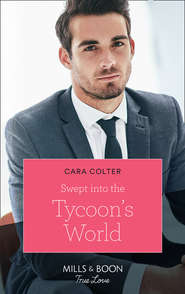По всем вопросам обращайтесь на: info@litportal.ru
(©) 2003-2024.
✖
Wedding Vows: With This Ring: Rescued in a Wedding Dress / Bridesmaid Says, 'I Do!' / The Doctor's Surprise Bride
Автор
Год написания книги
2019
Настройки чтения
Размер шрифта
Высота строк
Поля
A cad could probably spot that gentle, compassion-filled face from a mile away! It would be good for her to toughen up.
“Let me be very blunt,” he said, looking at the papers in front of him instead of her hair, the delicate creamy skin at her throat. “Second Chances is in a lot of trouble. I need to turn things around and I need to do it fast.”
“Second Chances is in trouble?” Molly was genuinely astounded. “But how? The secondhand stores that provide the majority of our funding seem to do well.”
“They do perform exceedingly well. The problem seems to be in an overextension of available funds. Your department?”
Here it was: could she make the kind of hard decisions that would be required of her if she took over the top spot in the newly revamped Second Chances?
The softness left her face, replaced with wariness. Better than softness in terms of her managerial abilities. If that was good, why did he feel so bad?
“You can’t run an organization that brings in close to a million dollars a year like a mom and pop store. You can’t give everyone who comes in here with their hand out and a hard luck story everything they ask for.”
“I don’t!” she said. “I’m very careful what I fund.”
He saw her flinch from his bluntness, but at this crucial first stage there was no other way to prepare people for the changes that had to happen. Another little curl broke free of her attempt to tame her hair, and he watched it, sentenced himself to another fifteen minutes on the bag and forged on.
“Two thousand dollars to the Flatbush Boys Choir travel fund? There is no Flatbush Boys Choir.”
“I know that now,” she said, defensively. “I had just started here. Six of them came in. The most adorable little boys in matching sweaters. They even sang a song for me.”
“Here’s a check written annually to the Bristol Hall Ladies’ Lunch Group. No paperwork. No report. Is there a Bristol Hall Ladies’ Lunch Group? What do they do? When do they meet? Why do they get money for lunch?”
“That was grandfathered in from before I started. Miss Viv looks after it.”
“So, you’re project manager, except when Miss Viv takes over?”
“She is the boss,” Molly said uneasily, her defensive tone a little more strident.
“Ah.” He studied her for a moment, then said softly, “Look, I’m not questioning your competence.”
She looked disbelieving. Understandably.
“It’s just that some belt-tightening is going to have to happen. What I need from you as I do research, review files and talk to people is for you to go over your programming in detail. I need exact breakdowns on how you choose programs. I need to review your budgets, I need to analyze your monitoring systems.”
She looked like she had been hit by a tank. Now would be the wrong time to remember the sweet softness of her skin under his fingertips, how damned protective he had felt when he heard about the cad. Now he was the cad!
“How soon can you have that to me?” he pressed.
“A week?”
A chief executive officer needed to work faster, make decisions more quickly. “You have until tomorrow morning.”
She glared at him. That was good. Much easier to defend against than sweet, shocked vulnerability. The angry spark in her eyes could almost make him forget her hair, that tender place at her nape. Almost.
He plunged forward, eager to get the barriers—compromised by hands in hair—back up where they belonged. Eager to find out what he needed to know about her—professionally—so he could make a recommendation when the job here was done and move on.
“I’ve been sorting through paperwork for a number of weeks,” he told her. “I have to tell you, after a brief look, it’s quite evident to me that you’re going to have to ax some of your projects. Sooner rather than later. I’ve short-listed a few that are on the block.”
“Ax projects?” she said with disbelief. “Some of my projects are on the block?”
He nodded. He felt not the least like a knight riding in to rescue the business in distress. Or the damsel. He was causing distress, in fact. The feeling of being the cad intensified even though he knew in the long run this would pay off for Second Chances, guarantee their good health and success in the coming years and possibly decades if this was done right, if they had the right leader to move ahead with.
“Which ones?” She went so pale a faint dusting of freckles appeared over the bridge of her nose.
He was annoyed that his feeling of being the cad only deepened, and that she was acting as if he had asked her to choose one of her children to float down the river in a basket. He was aware of feeling the faintest twinge of a foreign emotion, which after a second or two he identified, with further annoyance, as guilt.
Houston Whitford did not feel guilty about doing his job! Satisfied, driven, take charge, in control. Of course, generally, it would be fairly safe to say he didn’t feel, period.
He used a reasonable tone of voice, designed to convince either her or himself that of course he was not a cad! “We have to make some practical decisions for the future of this organization.”
She looked unconvinced about his cad status, and the careful use of the we did not even begin to make her think they were a team.
She looked mutinous, then stunned, then mutinous again. Her face was an open book of emotion.
“Is it that bad?” she finally sputtered. “How can it be? Miss Viv never said a word. She didn’t even seem worried when she left!”
He had actually sheltered Miss Viv from how bad things were as he had begun to slug his way through the old gal’s abysmal record and bookkeeping systems. Miss Viv—and his mother, Second Chances’s largest patron—trusted him to fix this. He would. Neither of them needed to know the extent he had to go to. But Molly Michaels did, since the mantle of it all could quite possibly fall on her slender shoulders.
“Yes, it’s bad.” He closed the fuchsia cover on one of the project reports, the mauve one on another and put those files on the desk between them. “The Easter Egg hunt is gone. The poetry competition is out. And I’m looking at the prom dress thing, and—”
“Prom Dreams?” she gasped. “You can’t! You don’t know what it means to those girls.”
“Have you ever known real hardship?” he asked her, his voice deliberately cold. This job was not going to be easy no matter how he did it. Hard choices had to be made. And he had to see if she was willing to make them. There was no way she was going to be suited to taking over the top job at Second Chances if she was always going to be blinded by the stars in her eyes.
But cad that he was, his gaze went to the lip that she was nibbling with distraction. He was shocked that out of the blue he wondered if one of his hard choices was not going to be whether or not to taste those luscious lips before he made his escape!
She met his eyes. Stopped nibbling. Things that should be simple, cut-and-dried, suddenly seemed complicated. He wished she wasn’t looking at him as if she was remembering, too, that unguarded moment when two strangers had touched and the potential for something wild and unpredictable had arced in the air between them.
“My parents divorced when I was young,” she offered, softly. “I considered that a terrible hardship. The only one I’ve known, but life altering.”
Thank God she didn’t mention the cad! He could see the pain in her eyes. Houston reminded himself, sternly, that he likely had a genetic predisposition toward allowing women to make him crazy. Because he had no business thinking of trying to change the light in her eyes. But he was thinking of it, of how soft her lips would be beneath his own.
Why would that genetic predisposition toward crazy be surfacing now, for God’s sake? He’d been around many, many beautiful women. He’d always taken his ability to keep his emotional distance for granted, one of the few gifts from his chaotic childhood.
Don’t form attachments. Don’t care too deeply.
Except for his business and boxing. Both had rigid guidelines and rules that if followed, produced a predictable result. That made them safe things to care about. An occasional bruised knuckle or fat lip, a skirmish in the business world, those hazards were nothing compared to the minefields of becoming attached to people, where the results were rarely predictable.
No, he knew exactly where he was going to channel his substantial passion and energy.
He was being drawn backward, feeling shadows from his past falling over him, entirely against his will. He blamed the letter from his father and the unfortunate fact it coincided with the past weeks of going over files of people who were as desperate and as needy as his family had once been.
It was his annoyance at himself for allowing those thoughts into his business world that made his tone even sharper than it had to be, even if he was testing her ability to run a million dollar corporation.
“Have you ever been hungry?” But even as he asked it, he knew that question, too, stemmed not so much from professional interest as from a dark past he thought he had left behind.
“No,” she said, “but I think I can imagine the desperation of it.”











